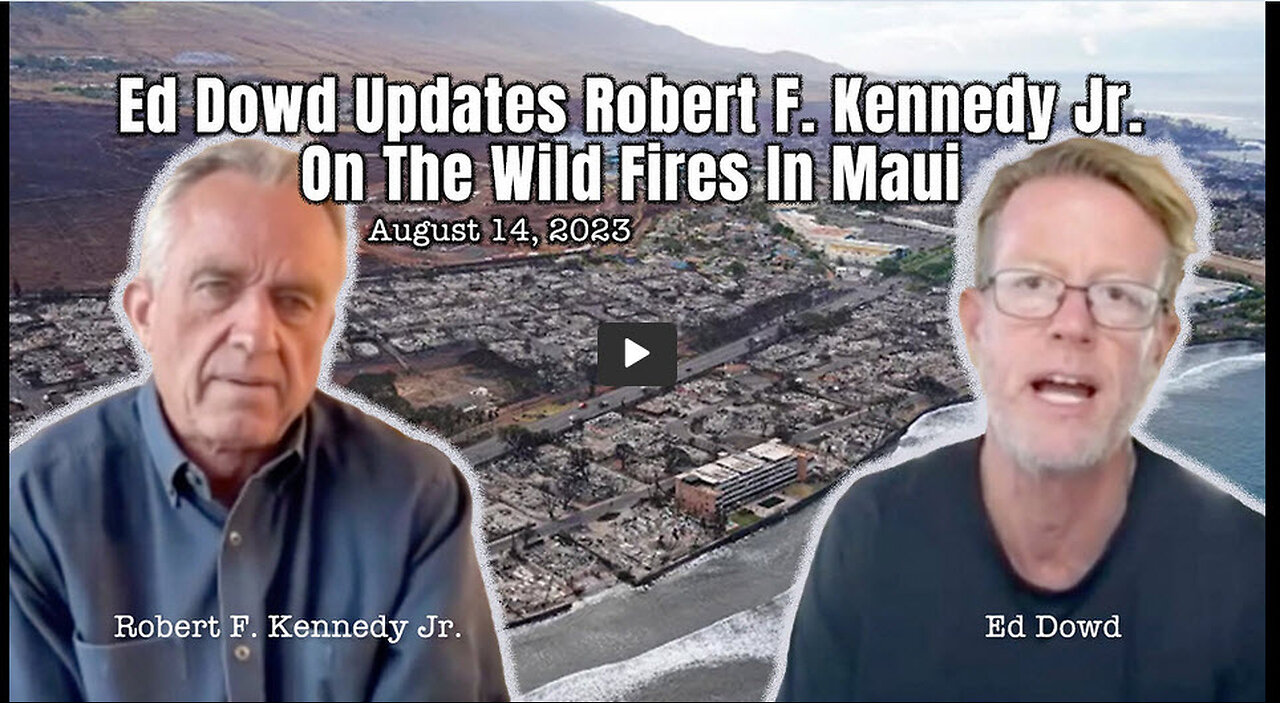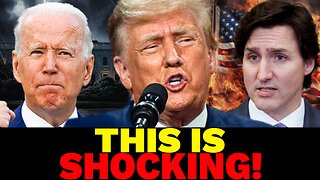Premium Only Content

Ed Dowd Updates Robert F. Kennedy Jr. On The Wild Fires In Maui (August 14, 2023)
My heart and prayers go out to the victims of the devastating wildfires in Maui that have claimed at least 96 lives so far and destroyed thousands of homes and businesses in and around the historic town of Lahaina.
Thoughts and prayers are not enough, however, as Americans demand to know how we can prevent such destructive wildfires in the future.
The first step is to accurately diagnose the problem.
"Hawaii's fire problem is due to the vast areas of unmanaged, nonnative grasslands from decades of declining agriculture," said Clay Trauernicht, a University of Hawaii at Manoa professor and environmental management expert.
"These savannas now cover about a million acres across the main Hawaiian islands, mostly the legacy of land clearing for plantation agriculture and ranching in the late 1800s and early 1900s."
The transformation of native Hawaiian ecosystems to nonnative grassland savannas makes the land much more susceptible to the hot, dry, and windy conditions that produce wildfires, said Trauernicht, who wrote a letter of public warning about the wildfire risk in Maui four years ago, after fires destroyed 21 homes.
"The fuels -- all that grass -- is the one thing that we can directly change to reduce the fire risk," he wrote in 2019.
In an article, "How Invasive Plants Caused the Maui Fires to Rage," the New York Times quoted Melissa Chimera, whose grandmother lived on the Hawaiian Commercial & Sugar Company's plantation: "These grasses are highly aggressive, grow very fast and are highly flammable." She added, "That's a recipe for fires that are a lot larger and a lot more destructive."
Hawaii's wildfire risk could be mitigated with "adequate support, planning, and resources for fuel reduction projects, agricultural land use, and restoration and reforestation," Trauernicht said.
Specific measures that can limit the destructiveness of wildfires, tropical fire specialists say, include building firebreaks, reintroducing fire-resistant vegetation, and allowing livestock to keep grasses at a manageable level.
Right now, in short, Maui needs a massive land restoration program.
That is exactly the kind of thing I have been fighting for my entire adult life. I have always taken on big corporate interests, polluters, and government agencies to protect and restore America's forests, soils, wetlands, rivers, and oceans.
Healthy ecosystems regulate the flood-drought cycle and mitigate wildfires. They draw down carbon, too.
Restoring the land is an achievable goal that will have an immediate effect on wildfires, in contrast to long-term efforts to address climate change, a contributing factor but not the primary cause of these fires.
"Blaming [Maui's wildfires] on weather and climate is misleading," said Trauernicht.
Climate change is making wildfires worse over the long term, due to hotter and drier conditions and heavier winds generated by hurricanes. However, deforestation and soil abuse also cause drier conditions by reducing evapotranspiration and water retention.
We must directly address the immediate causes of wildfires as we resist calls to boil complex environmental challenges down to oversimplified and divisive answers.
Fighting along familiar dividing lines about climate change will not get the job done.
When it comes to wildfires, the conversation needs to be about changing the way we relate to the land. We need a policy of restoration and regeneration.
As President, I will address all of the factors that are weakening the environment and making it more susceptible to wildfires. And I will not allow crises and natural disasters to drive a wedge into an already polarized nation.
The tragic Maui wildfires should serve as a wake-up call. We must make a commitment to restore and regenerate our country, something all Americans can support. Climate activists and skeptics alike can get behind restoring our forests, wetlands, rivers, and soils. That's the kind of unity that will power an environmental renaissance.
-
 54:38
54:38
LFA TV
1 day agoThe Resistance Is Gone | Trumpet Daily 12.26.24 7PM EST
51.7K9 -
 58:14
58:14
theDaily302
17 hours agoThe Daily 302- Tim Ballard
52.8K3 -
 13:22
13:22
Stephen Gardner
11 hours ago🔥You'll NEVER Believe what Trump wants NOW!!
102K234 -
 54:56
54:56
Digital Social Hour
1 day ago $10.51 earnedDOGE, Deep State, Drones & Charlie Kirk | Donald Trump Jr.
56.4K5 -
 DVR
DVR
The Trish Regan Show
12 hours agoTrump‘s FCC Targets Disney CEO Bob Iger Over ABC News Alleged Misconduct
61.7K37 -
 1:48:19
1:48:19
The Quartering
13 hours agoElon Calls White People Dumb, Vivek Calls American's Lazy & Why Modern Christmas Movies Suck!
143K112 -
 2:08:42
2:08:42
The Dilley Show
14 hours ago $36.74 earnedH1B Visa Debate, Culture and More! w/Author Brenden Dilley 12/26/2024
123K41 -
 4:55:59
4:55:59
LumpyPotatoX2
16 hours agoThirsty Thursday on BOX Day - #RumbleGaming
113K7 -
 1:04:52
1:04:52
Geeks + Gamers
15 hours agoDisney RATIO'D on Christmas Day | Mufasa Embarrassed By Sonic 3
83.5K11 -
 8:27:46
8:27:46
Sm0k3m
19 hours agoRumblers Assemble
53K3